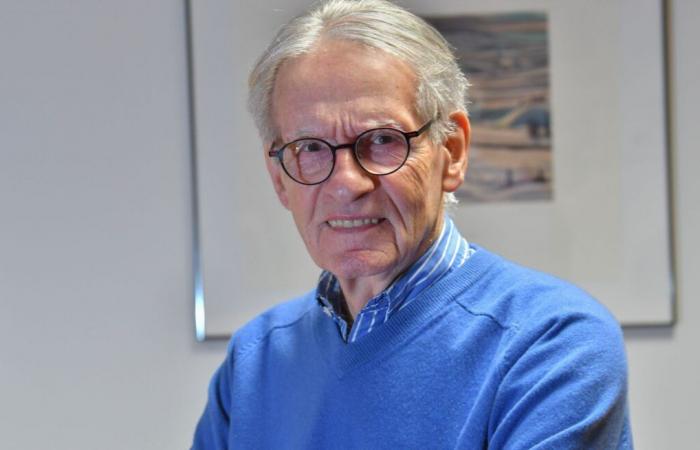
Gérard Bouchard is curious by nature. It is no coincidence that his collection Visions of Quebecwhich brings together several of his texts published from 2020 to 2024 in Dutyhas themes as diverse as the state of the French language, immigration and the decline of the United States. The fifty articles selected by the 81-year-old historian and sociologist, who co-chaired the famous Bouchard-Taylor commission, however deliver a pessimistic vision of our society, scratching in the process the policies carried out in recent years by the Legault government.
“You know, I don’t really know where Quebec is today,” says Gérard Bouchard straight away. With a serious voice, he begins the telephone interview by immediately expressing several of his concerns. “I am not sure that it is a society that dreams as it did in the 1960s with the Quiet Revolution and then in the 1980s-1990s with the sovereignty project. »
According to the author, Quebec has lost its hopes without replacing them. He does not see anything at the moment that could stimulate the spirits as has already happened in recent history. No large-scale projects that would call for citizen mobilization by energizing the entire population. “If we want to characterize the situation currently, optimists could say that we are in a period of transition, but the word transition means that we know where we are going. But this is not at all the case,” he emphasizes.
Still according to Mr. Bouchard, the CAQ government and Prime Minister François Legault are largely responsible for this societal wandering. The author also includes in his book his text entitled Make us dream a little, Mr. Legaultpublished in the pages of this daily on January 27, 2024. “Under his regime, the infrastructures are in disrepair, the health system and public finances with the enormous deficit which has just been announced are on the verge of collapse », he lists in an interview.
The historian and sociologist continues by denouncing the abandonment of public authorities in their support for the arts and letters, universities and the world of research which, according to him, are starving. “François Legault has no words. He controls the projects on a day-to-day basis. He is a superficial person, who greatly lacks competence and vision. I am extremely disappointed. He will leave a sad legacy,” he laments.
The Museum of Anger
The announcement in April 2024 of a National Museum of the History of Quebec was for Mr. Bouchard the icing on the sundae. By declaring that he wanted to make Quebecers proud with this new museum, François Legault aroused the ire of the author, who reacted immediately with a text published in May 2024 and included in the book. An institution dedicated to our national history should give off a meaning that sharpens the intelligence of future visitors, he emphasizes.
“Does this mean that the government will make a selection of episodes from the past which do us good and the others, less glorious, will we put them aside? I am not against pride, but the vocation of such a museum is to understand what we have done well and what is not so good,” he says.
When it comes to immigration, it’s not much better, argues the author, who once again criticizes Legault’s policies, which he describes as purely electoralist. “When he talks about immigrants, it’s almost always in the form of a problem. He never proposes a solution, such as integration into Quebec society. Immigration is more than an economic dimension. I always have in mind one of his ministers [Jean Boulet, ancien ministre de l’Immigration] who declared in 2022 that 80% of immigrants go to Montreal, do not work and do not speak French. We had not heard Legault intervene to slightly qualify his minister’s scandalous declaration. »
He maintains that immigration is a complex and serious issue, but regrets that leaders in Quebec, and elsewhere in the world, too often seize it for political interest. “Climate change, conflicts and poverty will worsen the phenomenon in the coming years. People will inevitably knock on the doors of Western countries. Governments need to prepare, instead of proposing simplistic ideas. »
But the author does not only have the Prime Minister in his sights. In his text Trump and the destruction of the American dreamhe criticizes the excesses of the American president about to take office at the White House. “With him, it is the praise of short thinking. This man has no sensitivity to foreign policy and the complexity of relationships between the peoples of the planet. It’s absolutely lamentable,” he added during his interview with Duty.
The collection, prefaced by Brian Myles, director of the daily Dutyimmerses the reader in a set of texts that explore the multiple facets of Quebec identity as well as its dark sides. In eleven thematic chapters ranging from memory to ethnocultural diversity, including the situation of the French language and the Quiet Revolution, he observes several phenomena of disintegration, notably a gradual loss of the values of freedom, social equality, pluralism and democracy.
Weakened values
“I worry about the future of our values adopted during the Quiet Revolution and which have left a long legacy. These are values that have reprogrammed the long-term future of Quebec. Neoliberalism has taken over when it comes to utopia, and that’s not good news. »
If these values are weakened today in Quebec, it is because its main vector, the school, is in serious crisis, he believes, the school system simply no longer managing to achieve its objectives with regard to modes of socialization of young people. “The fervor for teaching no longer exists and, meanwhile, the social networks that monopolize the attention of young people have become harmful and toxic competitors. What kind of adult are we preparing for the next twenty or thirty years? »
Mr. Bouchard’s reflections, written with a sharp pen and great intellectual rigor, offer an enlightening look at the issues that shape the national narrative. He sometimes goes back as far as the era of the land clearers, whose crucial role he rehabilitates in the construction of Quebec and its ideals of freedom. “I wanted to tell the story of these shadowy Quebecers whose destinies in remote regions are lessons in courage. These are the people who are the true heroes of Quebec. »





